
(Image: Gaak)
How healthy are you? Do you have a healthy diet? Do you exercise regularly? Do you drink at least eight glasses of water a day? Do you get enough sleep every day? Do you live a healthy lifestyle?
Our body is our temple and we need to take care of it. Do you know that over 70% of Americans are either obese or overweight?[1] That’s insane! Think of your body as your physical shell to take you through life. If you repeatedly abuse it, your shell will wear out quickly.
Life is beautiful and you don’t want to bog yourself down with unnecessary health problems. Today, your vital organs may be working well, but they may not be tomorrow. Don’t take your health for granted. Take proper care of your body.
Good health isn’t just about healthy eating and exercise — it’s also about having a positive attitude, a positive self-image, and a healthy lifestyle. In this article, I share 45 tips to live a healthier life. Bookmark this post and save the tips, because they will be vital to living a healthier life. :)
- Drink more water. Most of us don’t drink enough water every day. Water is essential for our bodies to function. Do you know over 60% of our body is made up of water? Water is needed to carry out body functions, remove waste, and carry nutrients and oxygen around our body. Since we lose water daily through urine, bowel movements, perspiration, and breathing, we need to replenish our water intake.

(Image: Andrey Armyagov)
Furthermore, drinking water helps in losing weight. A Health.com study carried out among overweight or obese people showed that water drinkers lose 4.5 more pounds than a control group! The researchers believe that it’s because drinking more water helps fill your stomach, making you less hungry and less likely to overeat.
The amount of water we need is dependent on various factors such as humidity, your physical activity, and your weight, but generally, we need 2.7-3.7 liters of water intake per day.[2] Since food intake contributes about 20% of our fluid intake, that means we need to drink about 2.0-3.0 liters of water or about 8-10 glasses (now you know how the 8 glasses recommendation came about!). One way to tell if you’re hydrated — your urine should be slightly yellow. If it’s not, like it’s dark yellow or even orange, you’re not getting enough water! Other signs include dry lips, dry mouth, and little urination. Go drink some water first before you continue this article!
- Get enough sleep. When you don’t rest well, you compensate by eating more. Usually, it’s junk food. Get enough rest and you don’t need to snack to stay awake. Also, lack of sleep causes premature aging and you don’t want that! Read: Having Insomnia? How To Get a Perfect Night’s Sleep
- Meditate. Meditation quietens your mind and calms your soul. If you don’t know how to meditate, don’t worry. Learn to meditate in 5 simple steps.

(Image: LuckyImages)
- Exercise. Movement is life. Research has shown that exercising daily brings tremendous benefits to our health, including an increase in lifespan, lowering of risk of diseases, higher bone density, and weight loss. Increase the activity in your life. Choose walking over transport for close distances. Climb the stairs instead of taking the lift. Join an aerobics class or a dance class. Pick a sport of your liking (see tip #5).
- Pick exercises that you enjoy. When you enjoy a sport, you naturally want to do it. Exercise isn’t about suffering and pushing yourself; it’s about being healthy and having fun at the same time. Adding variation in your exercises will keep them interesting. What exercises do you like and how can you include them in your routine?
- Work out different parts of your body. Don’t just do cardio (like jogging). Give your body a proper workout. The easiest way is to engage in sports since they work out different muscle groups. Popular activities where you can get a good body workout are trekking, hiking, swimming, basketball, tennis, squash, badminton, yoga, and frisbee.
- Eat fruits. Fruits have a load of vitamins and minerals. Do you know that oranges offer more health benefits than vitamin C pills? As much as possible, consume your vitamins and minerals through your diet rather than through pills. I eat a variety of fruits every morning and they energize me. Satisfy your palate with these nutritious fruits: Banana, Papaya, Kiwi, Strawberries, Blueberries, Blackberries, Raspberries, Watermelon, Rockmelon, Honeydew, Peach, Apple, Grapefruit, Pomelo, Mango, Orange.

(Image: Gaak)
- Eat vegetables. Vegetables are the source of many nutrients and minerals like folate, vitamin K, folate, vitamin A, manganese, and potassium, not to mention dietary fiber which is important for good gut health. There are two types of vegetables: Starchy vegetables like potato, sweet potato, yam, and pumpkin; and non-starchy vegetables like kale, arugula, spinach, broccoli, brussels sprouts, long beans, tomato, cucumber, and mushroom (technically a fungus). Some vegetables are slightly starchy and hence fall in the middle: Corn, green peas, carrot, artichoke, beetroot, cauliflower, and beans (technically legumes). All vegetables are important and enrich our diet.
I typically have raw salads for lunch every day with a variety of vegetables, then a cooked dinner with grains, potatoes/sweet potatoes, and other delicious vegetables. You want to have a variety of vegetable intake to strengthen your immune system (see tip #9).
- Pick different-colored fruits/vegs. Always consume a wide variety of fruits and vegetables of different colors. Firstly, fruits and vegetables with different colors represent different anti-oxidant content, which removes free radicals that damage our cells and fights inflammation in our body. Secondly, when we eat a large diversity of fruits/vegetables, it creates a wide variety of good bacteria in our gut, which creates a strong defense line between us and the environment, improves our immune system, and strengthens our long-term health.
Eat fruits/vegetables of different colors: White (Bananas), Yellow (Pineapples, Mango), Orange (Orange, Papaya), Red (Apple, Strawberries, Raspberries, Tomatoes, Watermelon), Green (Avocado, Kale, Lettuce, Cucumber), Purple/Blue (Blackberries, Prunes). Here’s a full list under the color wheel.
If you have existing gut problems, be careful about eating excessive amounts of fiber as it may cause digestion and constipation issues.[3] Consume low-fiber foods as you let your gut heal, juice your fruits/vegetables to get their nutrients, and then build up your whole fruit/vegetable intake.
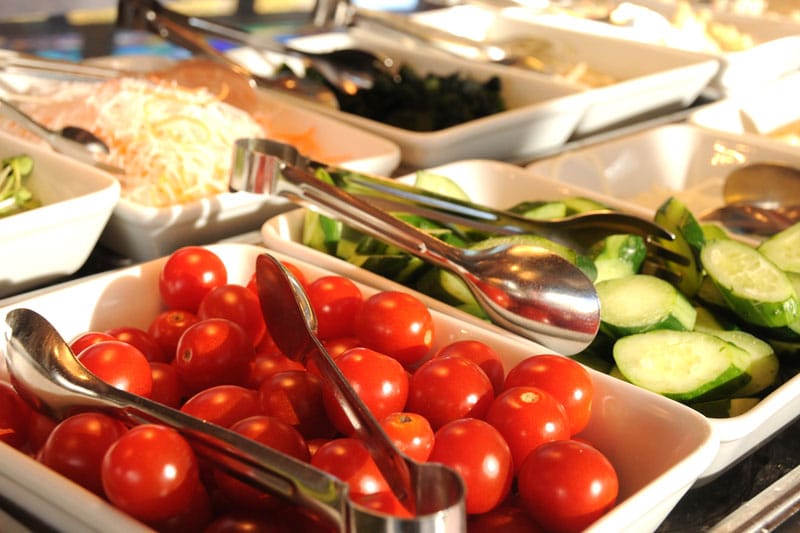
(Image: wasaitax)
- Cut down on processed food. Processed food is not good because (a) most of the nutritional value is lost in the creation of these foods, and (b) the added preservatives are bad for our health. Many processed foods contain a high amount of salt which leads to higher blood pressure and heart disease. In general, the more ingredients a food has on the label (ending with ‘ite’ or ‘ate’), the more processed it is. Go for less processed food such as a baked potato over chips, fresh fruit over canned fruit, and intact grains over white bread.
- Choose intact grains over refined grains. Intact grains contain all the essential parts of the grain seed; in other words, they contain 100% of the original kernel, which includes the bran, germ, and endosperm. Because these layers are intact, the grain contains a richer nutritional profile of antioxidants, vitamins, and minerals than refined grains (which are grains stripped of the bran and germ layers through processing).[4]
Go for intact grains like steel cut oats, barley, brown rice, quinoa, buckwheat, millet. Refined grains include white rice, white flour, most types of bread, white pasta, quick oats, and cereals. The more processing a grain has been through, the more refined it is. If you’re starting out, there’s no need to 100% ban refined grains — moderation is the key. Transition to a more intact-grains-based diet by swapping refined grains with intact grains for 1-2 meals a week and increasing it from there.
- Love yourself. Self-love is a crucial part of living a healthy life. When you have a negative self-image, it naturally weighs down on your mental outlook and health. How much do you love yourself on a scale of 1-10? Why? How can you love yourself more starting today? Read: How To Love Your Body (series) and Day 13: Appreciate Yourself of my Be a Better Me in 30 Days.

(Image: Andrea Haase)
- Walk/Run barefoot. There are many benefits of barefoot walking/running, from having a better posture to less stress for your feet and joints. If the terrain in your neighborhood is too sharp, wear barefoot shoes. I’ve been running barefoot since May 2010 and loving it. Read: 10 Reasons To Run Barefoot
- Purge negative people from your life. Positive mental health is part of a healthy life. You don’t need toxic people in your life. If you feel that a friend is overly critical or negative, let him/her go. Check out:

(Image: Pink Sherbet)
- Purge negativity from yourself. You don’t need negativity from yourself either. Listen to the thoughts that come up and get rid of your negative thoughts. One great way to remove your negativity is to brain dump when you feel frustrated. I do this with my clients, where I ask them to write out their deepest thoughts so that we can address them. Don’t keep these thoughts pent up inside you — it’s not healthy. Watch: How To Stay Positive All the Time [Video]
- Avoid trigger foods. Trigger foods are the foods that make you go berserk and binge after you eat them. Everyone’s trigger foods are different (mine used to be doughnuts, pastries, and chips), but generally trigger foods are candy bars, chocolate, confectionery, chips, cookies, or anything with a high level of refined sugar, salt, or flour. These foods cause a blood sugar imbalance, hence triggering one to eat more. What are your trigger foods? Identify them and remove them from your diet.
- Breathe. Deeply. Oxygen is vital for life. You may know how to breathe, but are you breathing properly? Most of us aren’t breathing properly — we take shallow breaths and breathe to 1/3 of our lung capacity. Athletes are taught proper breathing techniques to get their best performance. A full breath is one where your lungs are fully filled, your abdomen expands, and there’s minimum movement in your shoulders. Watch: Breathe to Heal [Video]

(Image: altafulla)
- Improve your posture. Having a good posture improves your breathing (see tip #17) and makes you look smarter and more attractive. Read more: Benefits of a Good Posture (And 13 Tips to Get One)
- Address emotional eating issues. Do you eat when you feel stressed, bored, or frustrated? Emotional eating is eating to fill an emotion rather than real hunger. However, emotional eating will never make you feel happy because you’re trying to fill a void that has nothing to do with food. Food doesn’t give you love or happiness; it’s just food. Get to the root of the issue and address it. Read: How To Stop Emotional Eating (series)
- Eat small meals. Choose several small meals over huge meals as it evens out your energy distribution. It’s also better for your stomach as it doesn’t over-stretch from digesting a huge volume of food at one go. In general, eat when you feel hungry and stop when you’re full (see tip #21). You don’t need to wait until official mealtimes before you start eating. Listen to your body and what it tells you.

(Image: wrangler)
- Stop eating when you feel full. Many of us rely on external cues to tell when we’re full, such as whether everyone has finished eating or whether your plate is empty. These are irrelevant: you should look at internal cues, such as whether your stomach feels full and how you feel. Don’t eat just because there’s food on the plate. I stop when I feel about 3/4 full — if I eat till I’m totally full, I feel bloated. Listen to your gut and learn when it’s time to stop!
- Follow food-combining principles. Food combining is a term for a nutritional approach that advocates specific combinations of foods. After following food-combining principles, my digestion improved greatly. In general you should (1) stick to simple meals, (2) eat fruit as the first meal of the day, (3) never eat fruits after cooked food, even if many hours have passed, (4) only mix grains/starch with vegetables in a meal (it’s okay to add some fat), (5) never mix protein with starches in a meal, (6) only mix protein with non-starchy vegetables. I recommend reading David Klein’s book Self-Healing Colitis & Crohns — it has important information on improving gut health, including sections on food combining principles. I don’t subscribe to all his recommendations but I find that his overall recommendations are excellent to anyone who wants to have good gut health, not just people with colitis or gut disease.
- Live a life of purpose. Blue Zones are regions of the world where people live the longest and healthiest lives. There are nine shared characteristics of these regions (many of which are in this list), and one important characteristic is to have a purpose. The Okinawans call it ikigai and the Nicoyans call it plan de vida. Are you living a life of meaning? Are you living in line with your purpose each day? Since I started living my purpose, I’ve never been happier. And you can experience that too. Read: Discover Your Purpose in Life (series)
- Cut down on deep-fried food. Deep-fried food contains acrylamide, a potentially cancer-causing chemical. According to a BBC report, an ordinary bag of crisps may contain up to 500 times more of the substance than the top level allowed in drinking water by the World Health Organisation (WHO)! When I consume oily foods, I feel sluggish. Go for food prepared using healthier methods instead, such as grilling, steaming, stir-fry, or even raw food. Reduce your intake of fast food, fries, doughnuts, chips, wedges, and deep-fried food.
- Cut down on sugary food/drinks. Sugary food consists of your candy bars, pastries, chocolate, cookies, cakes, and jelly donuts. Not only do they not fill you, but they trigger you to eat more due to the sugar rush. Eating once in a while is okay, but not daily. Go for healthy snacks instead. Sugary drinks are unfortunately sold everywhere today, namely in the form of soda and sweet drinks. These drinks are unhealthy and cause weight gain. Go for plain water, green tea, or vegetable juices instead! Read more: 5 Reasons To Quit Soda (And How to Do It)
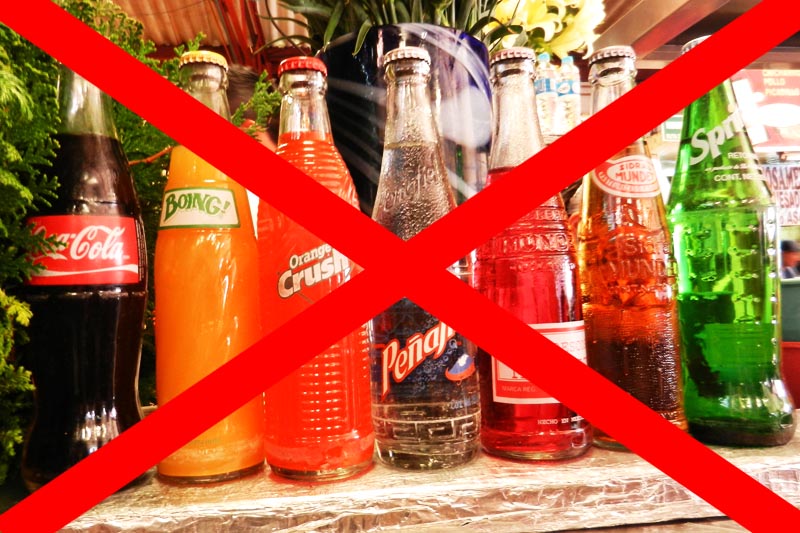
(Image: Travis)
- Don’t drink alcohol. Alcohol is a diuretic, which means it drains water from your body. Not only that, but alcohol is repeatedly proven to have negative effects on our body and health — impacting the proper functioning of our brain, liver, lungs, and other major organs. If you drink alcohol regularly, it’s time to cut it out, or at the very least, reduce your consumption.
- Go organic (where possible). Organic food is food produced without synthetic inputs such as pesticides and chemical fertilizers; that does not contain genetically modified organisms; and that is not processed using irradiation, industrial solvents, or chemical food additives. The organic movement is slowly catching on with more stores offering organic options. While organic food tends to cost more, would you rather save some money and feed your body with pesticides or pay a few extra dollars for a cleaner, healthier body? I try to buy organic where possible (depending on budget).
- Beware of vegetable oils. Over the years, I began to learn more about healthy vs. unhealthy food. I learned that many vegetable oils, which are basically used in many food products and almost all restaurants today, are toxic. This includes all refined oils such as canola oil, rapeseed oil, soybean oil, palm oil, sunflower oil, and even olive oil. Despite the whole “heart healthy” branding surrounding vegetable oils, oil is not a natural food. It’s an extremely processed food stripped of all the nutrients/fiber/protein/etc. of the original food. Many commercial oils are high in omega-6 polyunsaturated fat which is inflammatory.[5] In fact, the current prevalent use of vegetable oils was practically non-existent before the 1900s, and it was from a strong marketing push in the 1910s that vegetable oil began to be used in a widespread manner. Today, corporations use vegetable oils in food because (a) they are cheap and (b) they lengthen the shelf life of food, but they are not healthy in any way and create a lot of toxicity to the body.
The best way to cut down on oil (because oil is everywhere) is to (a) prepare your own meals (see tip #29), and (b) be conscious of oil-free / less-oil menu options when you’re out. When consuming salads, opt for no dressing as most commercial dressings have oil. I recommend to do your own research — here are some to start with: link, link, link, and link.
- Prepare your meals. Whenever I can, I prepare my own meals. When you prepare your meals, you control what goes into them rather than choosing between sub-standard options in a restaurant. Get quality kitchen equipment — it will be your best investment ever. Having a blender makes it a breeze to make your fruit/vegetable juices! Having an instant pot and an oven makes cooking much easier too.
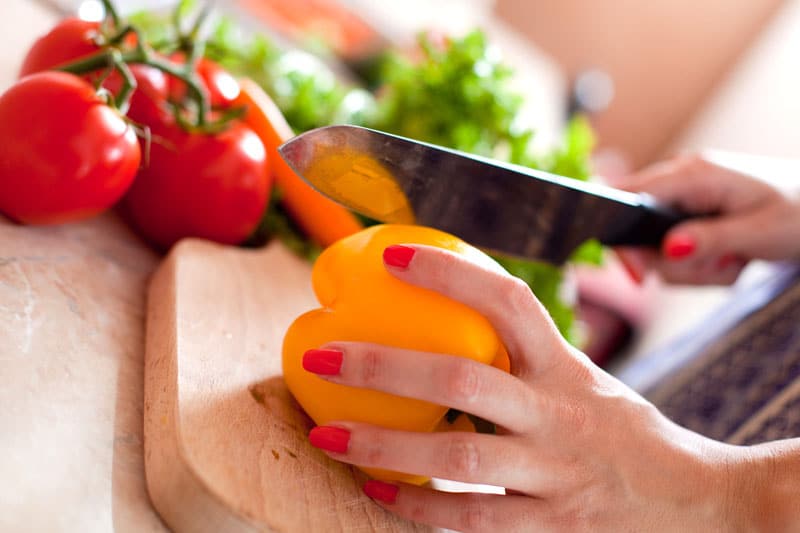
(Image: Igor S. Srdanovic)
- Learn to say no. Don’t eat just because you’re out with friends or because other people offer you food. Simply say no and say you’re not hungry if you don’t feel like eating. Read: How To Say No To Others
- Bring a water bottle when you go out. That way, you can drink whenever you want. It saves you money and you don’t need to resort to bad alternatives like soda.
- Eat what you need. It is better to eat less and in line with your energy needs, rather than eat excessively and work off excess calorie intake through exercise. When you eat excessively, you strain your digestive system by making it digest more food than you need, and when you exercise excessively, you strain your body.
- Stop smoking (and avoid passive smoking).
- Stop smoking. Smoking is detrimental to health, severely increases the risk of lung cancer, kidney cancer, esophageal cancer (of our gullet), heart attack, and more. Smoking “lite” cigarettes do not decrease health risks either. If you’re a smoker, quit not just for yourself, but for your family and friends. If you don’t smoke, stay that way and don’t start. Read: What Happens When You Quit Smoking [Infographic]

(Image: Curtis Perry)
- Avoid passive smoking. Second-hand smoking (breathing in air from smokers) causes many of the same long-term diseases as direct smoking (Wiki). Did you know? According to the CDC (Centers for Disease Control and Prevention), there is no risk-free level of passive smoking; even brief exposure can be harmful to health. Get away from smokers and avoid cigarette smoke where you can.
- Stop smoking. Smoking is detrimental to health, severely increases the risk of lung cancer, kidney cancer, esophageal cancer (of our gullet), heart attack, and more. Smoking “lite” cigarettes do not decrease health risks either. If you’re a smoker, quit not just for yourself, but for your family and friends. If you don’t smoke, stay that way and don’t start. Read: What Happens When You Quit Smoking [Infographic]
- Have healthy snacks. If you’re hungry at work, eat healthy snacks like fruits, vegetable juices, and yogurts. These are nutritional and don’t give you that sugar rush. Have them readily available so that you can get a munch and stop when you have your fill. Stay away from cookies and candy bars.
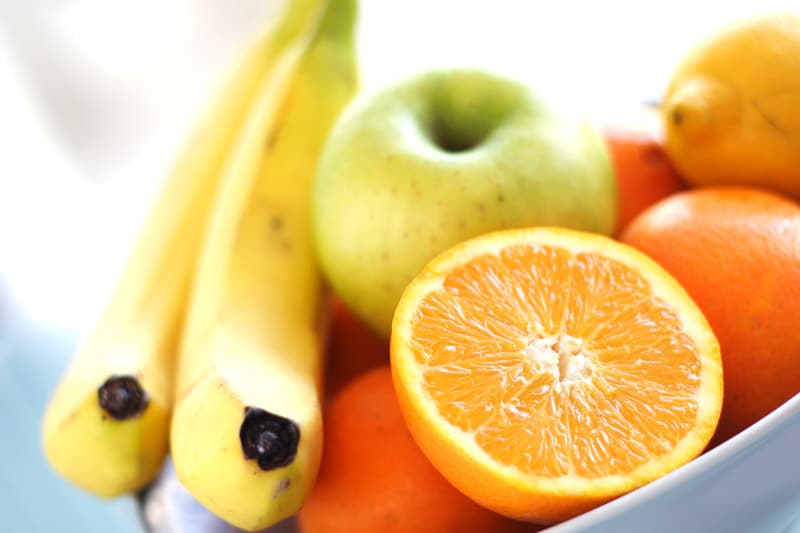
(Image: Liv friis-larsen)
- Try juicing/blending. Juicing/Blending is a great way to get vitamins and nutrients from fruits/vegetables quickly. Juicing is where you extract the juice using a juicing machine, removing the fiber. With blending, the fiber is not filtered away so you’re drinking the juice and fiber. Ultimately, juices and smoothies complement each other — juices give our digestive system a break while blending retains the fiber from fruits/vegetables which feeds the friendly bacteria in the gut. I personally love drinking juices and smoothies, and consume both on a regular basis. If you’re new to juicing, learn more about it here and check out these sample juicing recipes.
- Get regular checkups. Some diseases don’t show up as symptoms until it is too late. Get regular blood tests for blood sugar, vitamins, and minerals, along with urine tests. More elaborate tests like mammograms (for women) and PAP smear (for women) should be done at the recommended intervals. If the test results are not optimal, that means that you can quickly take corrective action. If they are great, that’s fantastic and you can have a peace of mind!

(Image: Stethoscope)
Try a vegetarian diet. Just to be clear, being vegetarian doesn’t automatically mean better health as there are tons of unhealthy vegetarian food out there (mock soy patties, refined carb, fried vegetarian food, sugary desserts). Trying a vegetarian diet is about being healthier — meat has been linked to inflammation[6][7][8] — and if it interests you, helping to reduce animal cruelty in the world. When done right, there are many proven health benefits of a vegetarian diet. You don’t have to go on a vegetarian diet forever — you can just try it out as an experiment, or just go vegetarian for two days a week. Get started here.
- Try a vegan diet. A vegetarian diet excludes animal products. A vegan diet excludes consume animal and animal-derived products. This means no eggs, dairy, honey, cheese, or milk. So in that sense, being vegan seems like a very strict diet in our meat-heavy food culture, but it is said to have even more positive benefits than a vegetarian diet! Learn more about veganism here, here, and here. As with a vegetarian diet, trying out a vegan diet doesn’t mean doing it permanently if you’re not ready for it — simply experiment, try it for a few weeks, or just go vegan for two days a week.
Do note that if you’re 100% vegan, there are certain vitamins and minerals that you should watch out on, specifically vitamin B12 and omega 3 (DHA/EPA). These can be easily added by eating the right foods and/or supplements (see tip #40).

(Image: Anna Pelzer)
- Try a raw vegan diet. A raw vegan consumes raw vegan food: mainly fruits, vegetables, and nuts amd seeds. Notice that as you progress from a vegetarian to a vegan to a raw vegan diet, you start to shift towards naturally occurring whole foods. There are many reported benefits of switching from veganism to raw veganism, including increased youth, weight loss, increased energy, and increased health benefits. Personally, while I enjoy eating raw meals and try to eat as high raw as possible, I find that it’s difficult to go 100% raw vegan in our current modern society as cooked food is too prevalent and it’s difficult to consume enough calories on a 100% raw vegan diet. That doesn’t mean that you can’t experiment! I have gone on several 21-day raw vegan trials before and felt very energized each time. These days, I eat about 30-40% raw (vegan) each day. Learn more about raw veganism here, here, here and here.
Supplement your diet as needed. Even when we eat healthily, there will be times when we lack certain vitamins/minerals because of many man-made processes have permanently altered our food supply chain. Common nutrient deficiencies are iron, vitamin B12, vitamin D (for those who live in places with winter), calcium, and magnesium.[9]
Note that it’s not always about popping a pill though. Supplements have their issues. For example, B12 supplements are linked to acne[10][11], while a 135-study review revealed little evidence that calcium supplements prevent fractures in healthy women, and in fact, may result in calcium deposits in arteries.[12] The best is to do your research and consume the required vitamins/minerals through diet (be it through wholefood or fortified food), and only take supplements when that’s not possible.
- Consume prebiotic food and fermented food.
- Prebiotics. Prebiotics are important for gut bacteria to flourish. Think of them as fertilizer for your gut microbiome. Research increasingly shows a link between our gut flora and overall health. Where possible, always choose prebiotic food over a prebiotic supplement vs. a prebiotic food. Prebiotic foods include raw onion, raw leek, raw garlic, potato starch, and unripe bananas. Read: 19 Best Prebiotic Foods
- Wild Fermented Food. As you consume prebiotics, take fermented food which is a great source of probiotics. Fermented foods include sauerkraut, kefir, kimchi, kombucha, pickles, and kombucha.
Instead of buying commercially fermented foods, get wild fermented foods. If you’re buying from a health food store, the product should say “wildly fermented.” That’s because commercially fermented food typically contains a few strands of probiotics, which is pointless as a healthy gut environment should have between 20,000 and 30,000 species of gut bacteria. Consuming commercially fermented food or even popping probiotic capsules (which usually contain between three and forty species) over the long term risks creating a monoculture of gut flora.
On the other hand, food that is wildly fermented (not created in a lab, but at home or in your garden) has the potential to give you thousands of species of bacteria. Read this article by Dr. Zach Bush, one of the few triple board-certified physicians in America: Why Probiotics Don’t Always Work. Learn how to ferment your food: Make Homemade Sauerkraut
- Experiment. The best way to know what works for you is to experiment. Rather than subscribe to one diet, try different foods and see how your body reacts. Most importantly, research and tweak your diet based on what you learn. I enjoy reading stories and research by people who have successfully reversed health diseases (rather than what’s reported by the medical establishment as I’ve come to realize that many medical conclusions today are flawed) and learning how to implement positive changes into my diet and life.
- Get out more often. If you have a 9-5 job, chances are you spend much of your time holed up in the office and not a lot of time going out and having fun. During weekends, you’re probably busy with work or running errands. Make a point to go out with your friends at least once a week. Get some sun. Go out and have a change of environment. It’ll be great for your body and soul. Read: Cooped Up Indoors? Get a Life with These 7 Tips
- Practice good dental hygiene. Good dental hygiene make you a lot more desirable and it is linked to better health. Brush your teeth twice a day, rinse your mouth after each meal, and floss after each meal if possible. Use a fluoride-free toothpaste to protect your gum health.
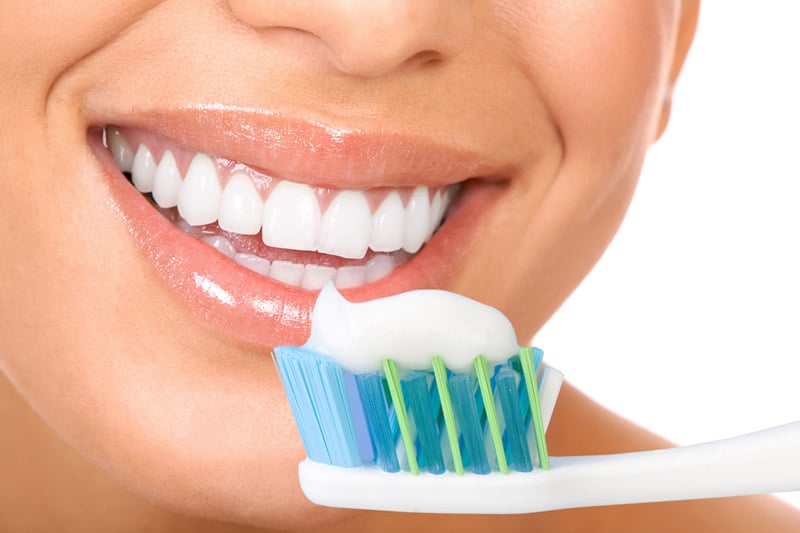
(Image: kurhan)
- Hang out with healthy people. You’re the average of the 5 people you spend the most time with, so the more time you spend around healthy people, the better it is. Dine with people who are health conscious and get workout buddies. It makes healthy living more fun! :)
Which health tips are most applicable for you right now? These are timeless tips, so bookmark this article and integrate these tips into your life. Share these tips with your family and friends to help them stay healthy.
Get the manifesto version of this article: The Healthy Living Manifesto



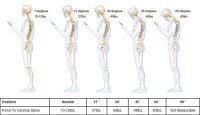





 Thanks for reading. If you like my free articles, join my private email list and get my latest updates and articles sent right to your inbox.
Thanks for reading. If you like my free articles, join my private email list and get my latest updates and articles sent right to your inbox.